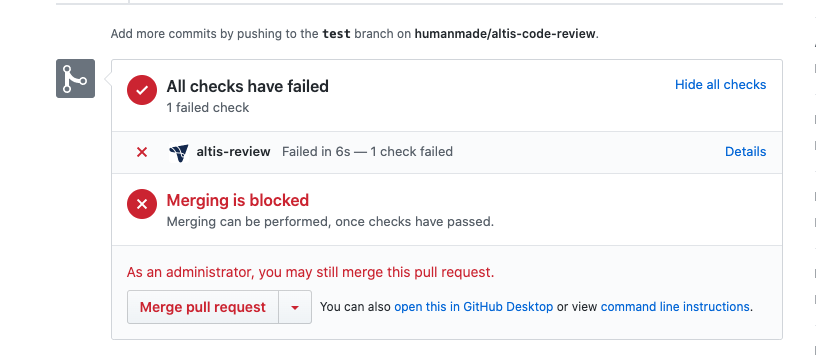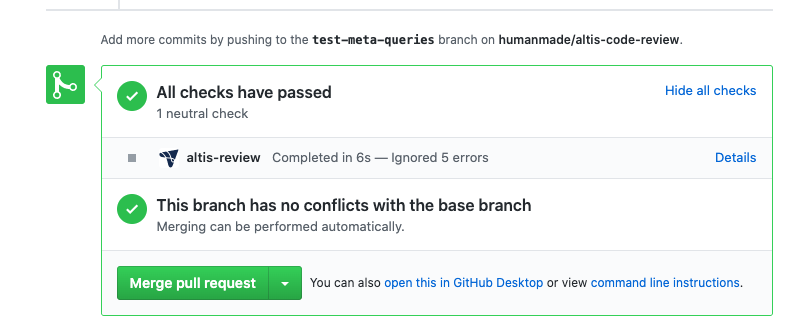Code Review
All Code Review for Altis is done via GitHub in the pre set-up GitHub repository for your project. Specific development flow process varies project to project, this document only covers the required Human Made Code Review. Specifically where in the "code development to running in production" flow the Human Made Code Review needs to be performed can be discussed separately.
It is required that all code review be performed on Git branches, via a GitHub Pull Request. When a given Git branch is ready for review, the following process should be followed:
- Open a Pull Request against the "mainline" branch (typically
masterorstaging) - Make sure your Pull Request passes any status checks and WordPress Coding Standards.
Once the Pull Request is submitted, an automated code review will be performed. In this case, the Pull Request will be marked as "Changes Requested" and you should fix up any errors to do with formatting for the manual review to continue.
Manual Code Review
Upon receiving a new Pull Request, Human Made may also perform a manual code review. This will result in one of three outcomes:
- "Changes Requested" - We asked for some things to be changed in the code, they should be rectified before a second review pass.
- "Commented" - We asked a question of for more information for the Pull Request. Get back to us, and we'll be able to continue.
- "Approved" - The code is ready to be merged into the mainline branch, and will not need to be reviewed again on it's way to production!
Once a Pull Request is reviewed, the next steps depend on the process of the project. You may communicate on the Pull Request for Human Made to merge and deploy the Pull Request on Approval. This can be done via a comment, or a label of "Review Merge" or similar.
The Pull Request will be assigned back to the developer, if the Pull Request requires changes or comment. Once the changes have been made, the developer should assign the Pull Request back to the @humanmade-cloud GitHub user.
If you only want code reviewed, but not yet merged and deployed then you don't need to do anything. This is useful if you want to control when code is merged to the mainline branch, as you can perform the merge yourself.
Note: If you have requested Code Reviews from other users, we will not merge and deploy a Pull Request until those users have also Approved the Pull Request.
Automated Code Review
With v4, Altis is beginning the rollout of a new automated process for code review, which aims to eventually replace the manual code review process. This process will speed up the review and deployment process, allowing for faster iteration on your project. Additionally, programmatic coding standards will ensure that reviews are more consistent, and can be run ahead of time using local tooling.
Automated Code Review (ACR) is similar to the manual process and is kicked off when a Pull Request (PR) is created. Every commit pushed to a branch after the PR is created will have the ACR process executed against it.
During the initial roll-out of this process, manual reviews will still be performed by the Altis Cloud team, but they will be assisted by the ACR tooling.
How will I know if there are issues with my code?
Errors are highlighted within GitHub, under the review section.

Details:

If no errors are found:

What types of code are checked?
The types of code that are reviewed are JavaScript and PHP. CSS files can also be reviewed but are not at this point.
Note that JavaScript code should not be minified, and instead should be built via the build process.
What is looked for?
Code review focuses on security, performance, and stability by testing for common vulnerabilities and problems, such as the OWASP Top Ten.
This includes, but is not limited to:
- SQL Injection
- XSS and XSRF attacks
- Escaping output and sanitizing input
- Dependency vulnerabilities
The coding standards documentation contains much more detail about the specific rules your code must pass.
What should I do if errors are found?
Before a pull request can be merged, the altis-review check must pass.
In general, the errors should be addressed, using the provided details in order to resolve the issue. The Altis Cloud team is happy to provide guidance on how to solve specific errors, or potential changes to your architecture to avoid these.
In rare cases, the error may be a false positive or a result where the check does not possess the required logic to adequately evaluate the part of code. If you are certain this is the case (such as for false positives), the error may be ignored, using the method below.
Is there a way I can have lines ignored?
Lines of code can be ignored however entire files and folders can not. A comment is also required so that future reviewers understand why the part of code is ignored from ACR/
Example
<?php
$test = 'Hello World';
// phpcs:ignore HM.Security.EscapeOutput.OutputNotEscaped -- Performing an example so we need to ignore the following line.
echo $test;
Note: When adding or changing these ignore comments, manual review of the codebase by the Altis Cloud team will be required per the Manual Code Review section.
Can I run this process locally?
To do so ensure you have the humanmade/coding-standards cloned into your repo using composer composer require --dev humanmade/coding-standards.
An Altis command is still in development, however, since the ACR is based on a custom PHPCS standard the process can be executed locally by running the following command vendor/bin/phpcs -e --standard=HM-Minimum.
 Documentation
Documentation